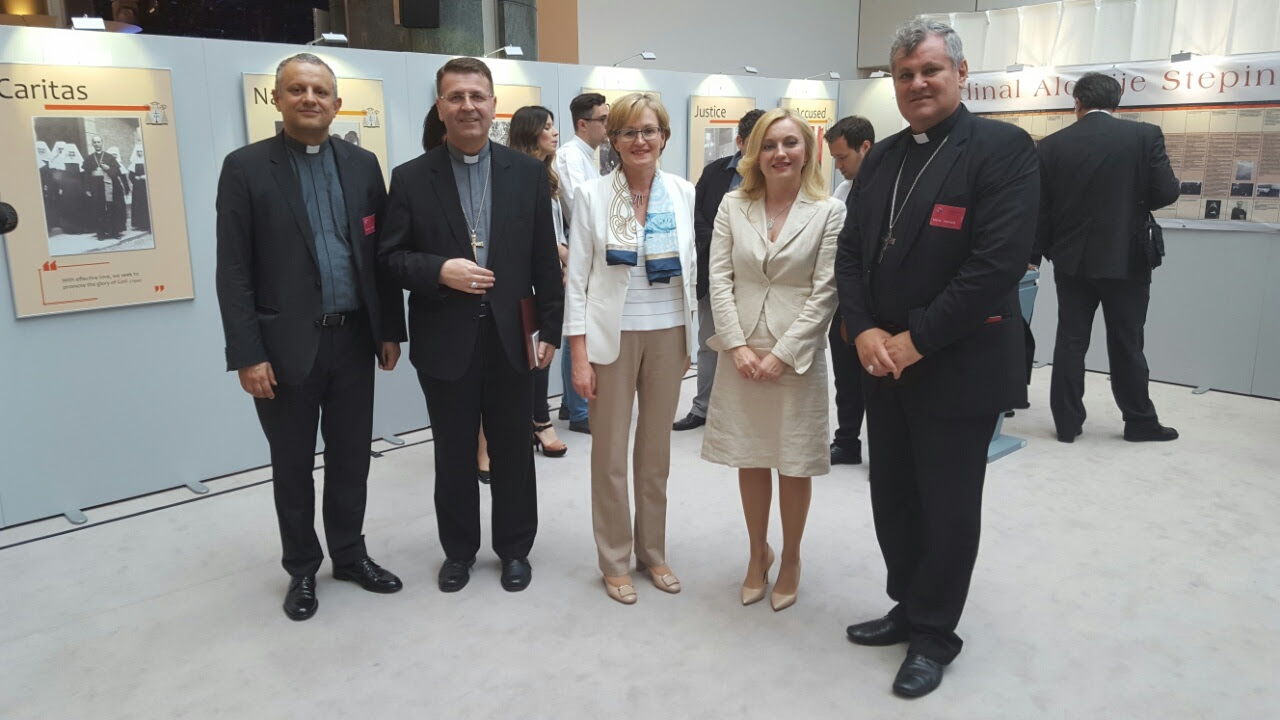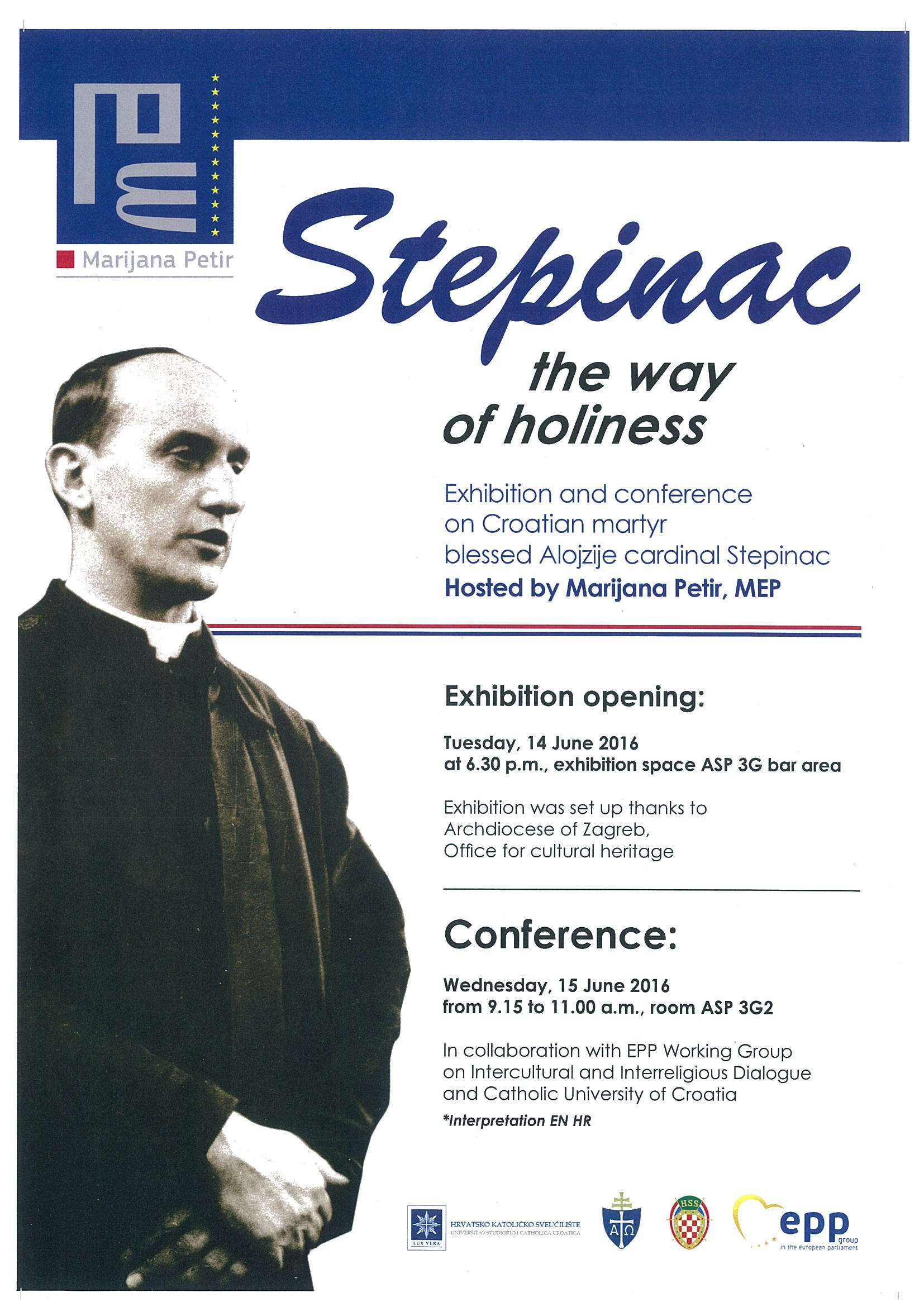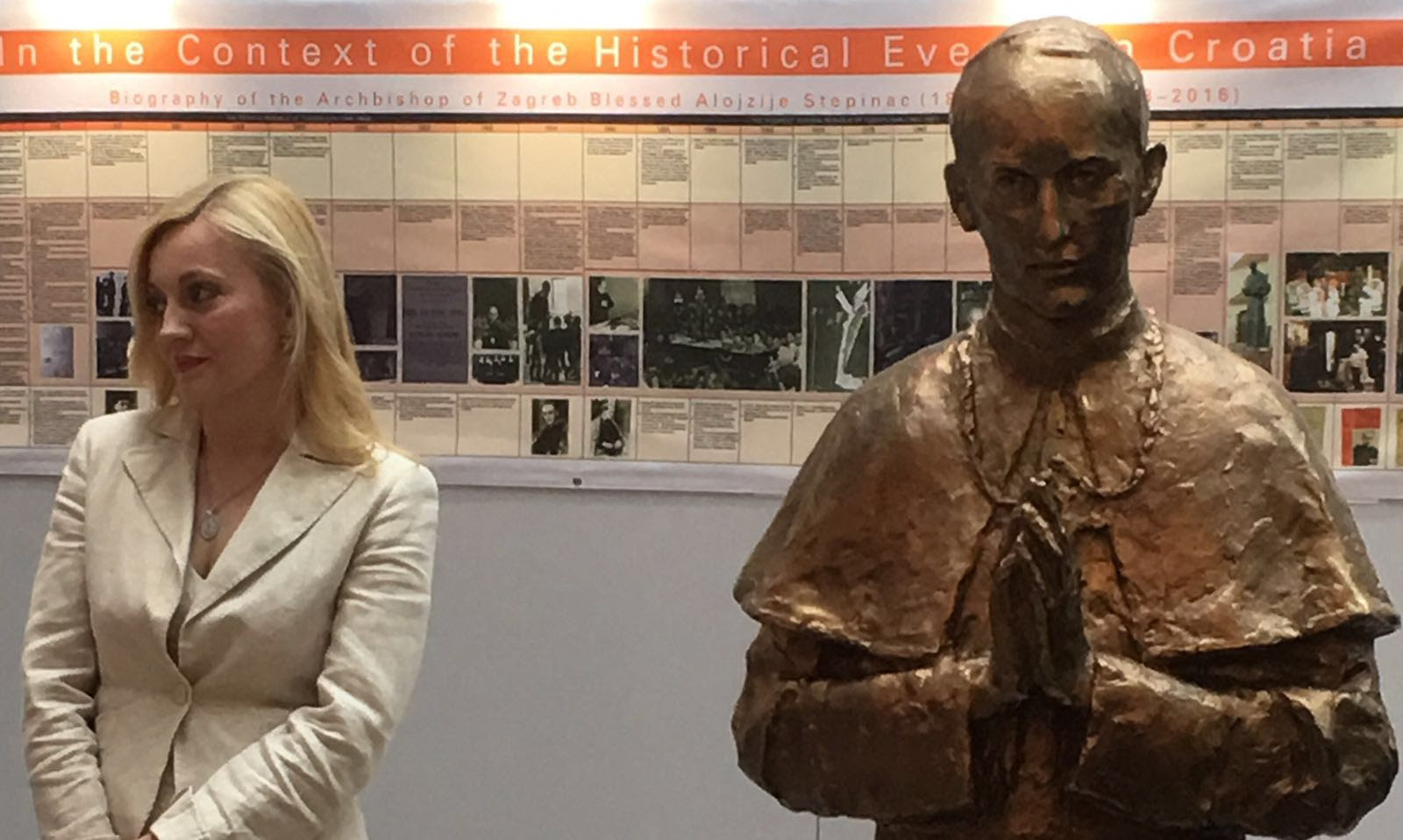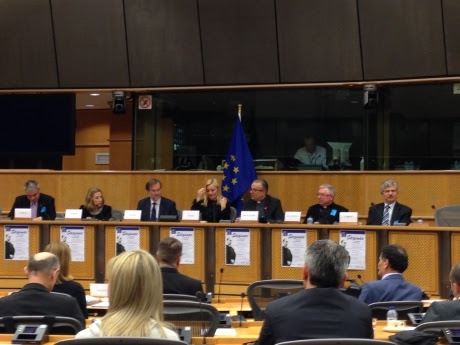Croatian member of the European Parliament Marijana Petir, the Zagreb Archdiocese and the Croatian Catholic University organised in the EU Parliament an exhibition on the life and work of the Blessed Aloysius Stepinac; the exhibition was opened at the European Parliament in Brussels on the evening of Tuesday 14 June 2016 and this important event was followed by a conference on Stepinac’s humanitarian work that started the next day and included presentations from the organisers as well as a paper by Dr Esther Gitman, US based renowned researcher and author of the book “When Courage Prevailed: the rescue and survival of Jews in the Independent State of Croatia 1941-1945" on WWII rescue and saving of the Jews in Croatia. Despite Serbia’s protests to the EU Parliament in which its Foreign Minister Ivica Dacic maliciously, and with utter disregard for the truth, said that the exhibition and conference of Aloysius Stepinac in the European Parliament is an attempt to remove responsibility from the Croatian cardinal and rehabilitate the Ustasha movement. The fact that Stepinac was not a member of the WWII Ustashe regime nor its supporter or follower Serbia still drives its wagon of lies and vilification against Croatia, against Stepinac, instead of facing its own demons from the past and present. Dacic said that the exhibition and conference “Croatian saint Cardinal Stepinac” are not “a step towards reconciliation nor to the truth, but only deepen divisions.” Perhaps Mr Dacic is fighting so hard in trying to stop the truth because once the real truth of WWII and the peril of Jews at the hands of Serbs come to the surface, Serbia will have plenty of crimes to finally answer for on the international podium that is still polluted by politicians like Dacic, who hide the truth that may go against their country or nation.
Marijana Petir, shrugged off as unimportant Serbia’s reported protest against the exhibition and conference and commented that the event received full support from the EUP – because the life and actions of Blessed Aloysius Stepinac were “as clean as a whistle”.

From left: Rector Zeljko Tanjic,
mons. Ivan SaSko,
Vice-president EUP Mairead McGuinness,
MEP Marijna Petir and mons. Vlado Kosic
at exhibition in EUP
Photo: http://www.unicath.hr
mons. Ivan SaSko,
Vice-president EUP Mairead McGuinness,
MEP Marijna Petir and mons. Vlado Kosic
at exhibition in EUP
Photo: http://www.unicath.hr
The European Parliament Vice President Mairead McGuinness, a MEP from Ireland, opened the exhibition with the opening ceremony attended, among others, by representatives of the Zagreb Archdiocese and Crotian Catholic University. Bishop mons. Ivan Sasko, an assisting bishop from the Zagreb Archdiocese, said that Stepinac was "an example of a European who lived the values of the culture of Christianity that has largely shaped Europe's identity." "His service made him permanently exposed... not only to the public but to the blows of three fatal ideologies - fascism, Nazism and communism, which marked a large part of the 20th century in Europe," said Sasko.
"At the time of communism, his good deeds were not spoken about and were covered up... the evidence of his exposure did not disappear despite its having been terribly distorted and manipulated," Sasko said, adding that after communism one could freely talk about Stepinac but that decades of propaganda had caused damage.
Blessed Alojzije Stepinac became Zagreb Archbishop in 1937. He was named a cardinal in 1953 and Pope John Paul II beatified him in the Croatian shrine of Marija Bistrica on 3 October 1998. His canonisation is expected soon even though Pope Francis has not yet nominated the date.
Blessed Alojzije Stepinac became Zagreb Archbishop in 1937. He was named a cardinal in 1953 and Pope John Paul II beatified him in the Croatian shrine of Marija Bistrica on 3 October 1998. His canonisation is expected soon even though Pope Francis has not yet nominated the date.
On Wednesday 15 June, at the conference start Marijana Petir said that “in the time of severely disrupted interpersonal relations, Blessed Alojzije Stepinac’s humanitarian work shows us the meaning of philanthropy in its splendor and fullness”. Relating to Stepinac’s charity work she said that “we can recognise its size – he had always had open eyes and heart for the weakest and most vulnerable, trying to alleviate their pain and suffering, and not afraid to take risks and risking his own."
The Rector of the Croatian Catholic University, Dr Zeljko Tanjic, emphasised that the “Croatian Catholic University is on of the youngest universities in Croatia and in Europe and it strives towards excellence scientific and teaching pursuits, but it’s also dedicated to the offering of examples and ideals that will help the students with their maturity, helping through the Christian vision of people and society shape their opinions, ideas and ways to act that will help change the Croatian and the European reality. These positive characteristics are unified in Aloysius Stepinac’s life and with his life and activities he is one of those people that are still much undiscovered across the European public as a forerunner of all fundamental ideas upon which the community of the European people and states were built, the ideas he drew from faith, loyalty to fundamental moral principles and those of Church’s mission, always defending the specificity and the importance of every person regardless of religion, race, nationality, gender or conscience, especially in hard times of the Ustashe and Communist regimes and totalitarianism. ”
The Rector of the Croatian Catholic University, Dr Zeljko Tanjic, emphasised that the “Croatian Catholic University is on of the youngest universities in Croatia and in Europe and it strives towards excellence scientific and teaching pursuits, but it’s also dedicated to the offering of examples and ideals that will help the students with their maturity, helping through the Christian vision of people and society shape their opinions, ideas and ways to act that will help change the Croatian and the European reality. These positive characteristics are unified in Aloysius Stepinac’s life and with his life and activities he is one of those people that are still much undiscovered across the European public as a forerunner of all fundamental ideas upon which the community of the European people and states were built, the ideas he drew from faith, loyalty to fundamental moral principles and those of Church’s mission, always defending the specificity and the importance of every person regardless of religion, race, nationality, gender or conscience, especially in hard times of the Ustashe and Communist regimes and totalitarianism. ”
Dr Esther Gitman delivered her presentation at the conference with particular focus on the importance of Dr Aloysius Stepinac and his word for the understanding of contemporary Europe, presenting a number of the researched facts of Stepinac’s good deeds during WWII, his tireless work in saving the vulnerable and the persecuted, his own persecution and false communist accusations, trial and prosecution. Dr Gitman concluded her presentation with the following words:
“…As mentioned earlier, the European Union aim was and still is, of ending wars among neighbors. European countries began to cooperate economically in 1951, only six countries participated, today, 28 member countries are in the union, with the accession of Croatia on July 1, 2013.
And we are hereby reminded that the creation and the ever growing life of peace and camaraderie among many different nations in contemporary Europe have been driven by the wisdom and fortitude of men like Croatia’s Alojzije Stepinac who has envisioned as essential the freedom and respect for the right of every nation to its full development and to independence in its national life. … This is the time when Europe needs leaders with a clear vision of a strong peaceful, and war free Europe.”
“…As mentioned earlier, the European Union aim was and still is, of ending wars among neighbors. European countries began to cooperate economically in 1951, only six countries participated, today, 28 member countries are in the union, with the accession of Croatia on July 1, 2013.
And we are hereby reminded that the creation and the ever growing life of peace and camaraderie among many different nations in contemporary Europe have been driven by the wisdom and fortitude of men like Croatia’s Alojzije Stepinac who has envisioned as essential the freedom and respect for the right of every nation to its full development and to independence in its national life. … This is the time when Europe needs leaders with a clear vision of a strong peaceful, and war free Europe.”
Media reported late last week, after the exhibition and conference in Brussels, that Serbia sacked its ambassador to the EU Dusko Lopandic, the official explanation being that he has been unable to prevent an exhibition in the European Parliament honouring Croatia’s Blessed Aloysius Stepinac! Such actions do make one very sick and to think Serbia is in pursuit of EU membership with such barbaric attitudes to the truth and freedom of expression! How awful would it be to "rub shoulders" with such hateful attitudes on daily basis along EUP corridors. Shudder to think. Just as well the Aloysius Stepinac exhibition and conference were a hit and a step further on the path to his canonisation, which is expected – and I would say due - in the near future. Ina Vukic, Prof. (Zgb); B.A., M.A.Ps.(Syd)






Nema komentara:
Objavi komentar